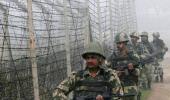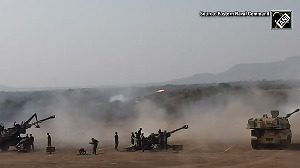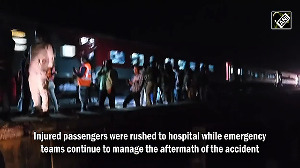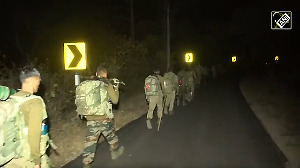New Delhi has reached out to neighbours like seldom before while singling Islamabad for criticism at international forums. Archis Mohan reports.

The terrorist attack at an army administrative base in Uri in Jammu and Kashmir on Sunday has reduced the political space for Prime Minister Narendra Modi to travel to Islamabad in November to attend the South Asian Association for Regional Cooperation Summit.
But, in recent months, New Delhi has shown uncharacteristic efficiency to reach out to SAARC members, other than Pakistan.
As part of the Modi government's "neighbourhood first" policy, India has hosted or will be hosting the heads of states or governments of the six Saarc members.
Alongside its Saarc outreach, the PM has raised the issue of terror havens in Pakistan and its export of terror at international platforms, most recently at the G20 Summit in China and the East Asia Summit in Laos.
The Indian side, led by Vice-President M Hamid Ansari, raised Pakistan's complicity in protecting outfits at the ongoing Non-Aligned Movement Summit in Venezuela.
While the prime minister will skip this year's United Nations General Assembly, External Affairs Minister Sushma Swaraj is set to raise the involvement of terror outfits based in Pakistan in carrying out attacks on Indian soil -- Pathankot last year and Uri now. She is also likely to tell the world how Pakistani government bombs its own people in Balochistan.
New Delhi has revived its strategy of isolating Islamabad within the SAARC.
The prime minister had first given evidence of this during the previous Saarc Summit, in Kathmandu, in end-November 2014 when he brought Bhutan, Bangladesh and Nepal to sign, along with India, a motor vehicle pact despite protests from Pakistan.
The actual agreement was signed in June 2015 and the first Bangladeshi goods vehicle, which had left Dhaka on August 27, reached the customs depot in New Delhi on September 5.
India has also approved an ambitious $1.04-billion project for constructing and upgrading 558 km of roads to link it with Bangladesh, Bhutan and Nepal, with the objective of increasing inter-regional trade by 60 per cent. The project is to be partially funded by the Asian Development Bank.
On October 15-16, India is to host the BRICS (Brazil, Russia, India, China, South Africa) Summit. For the retreat at the end of the Summit, New Delhi has invited leaders of the BIMSTEC (Bay of Bengal Initiative for Multi-Sectoral Technical and Economic Cooperation).
These are Bangladesh, Bhutan, Nepal, Sri Lanka, Myanmar and Thailand. That New Delhi has invited BIMSTEC leaders instead of Saarc has much to do with Pakistan being a member of the latter group.
India's Pakistan-Out strategy:
AFGHANISTAN
- Hosted President Ashraf Ghani on September 13-15
- Promised $1-bn aid, medicines, 0.17 mn tonnes of wheat
NEPAL
- Hosted new PM Pushpa Kamal Dahal on Sep 15-18
- Committed $750 bn; expediting road and hydropower projects
- Nepalese President Bidhya Devi Bhandari to visit India shortly; President Pranab Mukherjee to visit Nepal in November
BANGLADESH
- To host Bangladesh leaders as part of BIMSTEC in Goa
- India allows duty-free benefits to all Bangladeshi goods, minus 25 alcohol items
- Bangladeshi exports to India increased 30% in 2015-16
- India has accepted the adverse verdict of an international court on its maritime dispute with Bangladesh
BHUTAN
- Working on India-Bhutan-Bangladesh rail links
- Consent to Bangladesh investing in Bhutan’s hydropower sector and importing power
SRI LANKA
- India to host Sri Lankan President at BIMSTEC Summit next month
- Signed agreement with Sri Lanka to provide equipment worth $2 bn to fishing and farming communities
MALDIVES
- New Delhi hosted Maldivian President Abdulla Yameen Abdul Gayoom in April
Photograph: Dinuka Liyanawatte/Reuters












 © 2025
© 2025